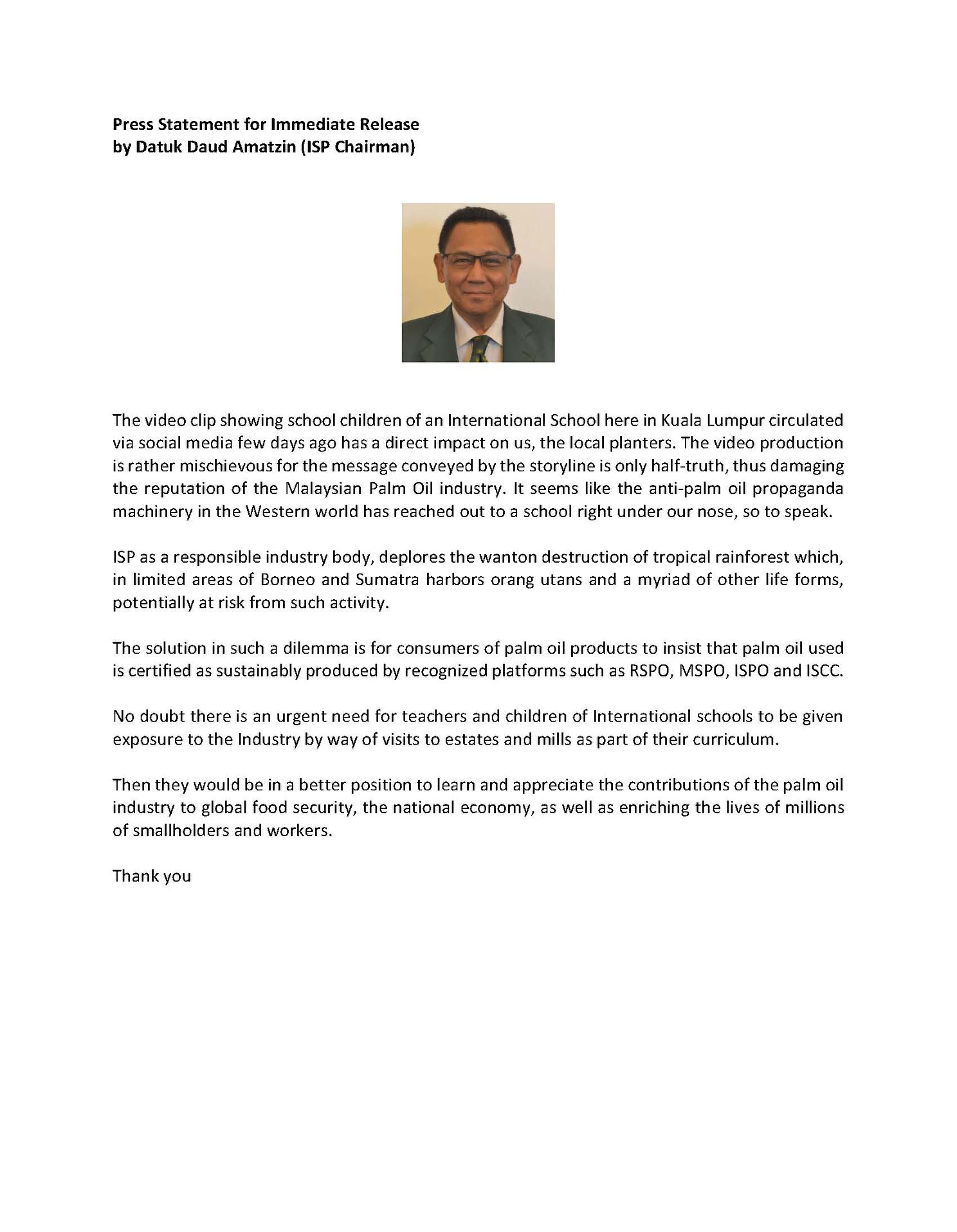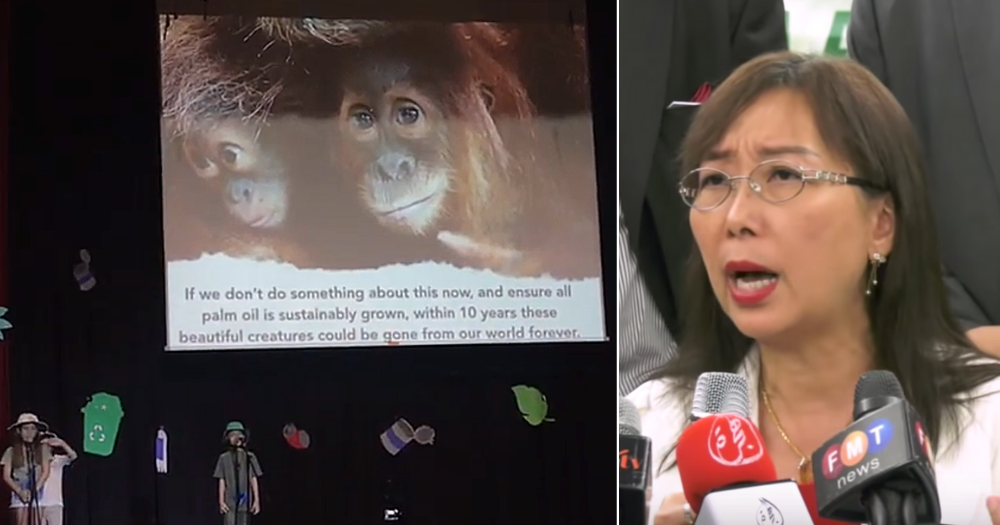A recent school play depicting the negative environmental impacts of palm oil was staged by students of an international school in Kuala Lumpur, Malaysia.
The play's contents were apparently deemed subversive by the Malaysia government, which led the Education Ministry to launch an investigation into the school.
What was the play about?
A short 70-second clip showing a snippet of the kids' play has been circulating online.
The video started off with the children, reportedly aged between eight and 10 years old, dressed in costumes and explaining how palm oil harms the environment.
A slideshow in the background cited the decline in local orangutan populations, a species that is highly endangered, and linked unsustainable palm oil production to deforestation.
The play also mentioned Rang-tan, a controversial television commercial produced for a British supermarket chain that attacks the palm oil trade.
The ad was subsequently banned for flouting UK rules on political advertising.
More students then flooded the stage, with some decked out in orange outfits and orangutan masks.
 Photo from The Malaysian Insight / Youtube
Photo from The Malaysian Insight / Youtube
You can watch the play here:
Teachers were "sowing hatred" against palm oil
The video caught the eye of the government, sparking heavy rebuke from Primary Industries minister Teresa Kok.
Kok slammed the international school in a press conference on July 2, calling for the school's teachers and principal involved to "come forward".
She also described the performance as "sowing hatred against palm oil plantations", and name-dropped Europe as one player attempting to do the same, reported The Star.
“I urge the school to stop all actions that are sowing anti-palm oil sentiments among Malaysian students, just like what Europe is doing against our country," Kok said.
 Kok at the press conference. Photo from The Star Online / Youtube
Kok at the press conference. Photo from The Star Online / Youtube
Kok said that instead of "criticising and spreading lies" to the children and doing a "disservice to the country", the school could have approached the ministry to better understand the palm oil industry, according to Malay Mail.
“I also urge the school’s headmaster and the teachers involved to come to my ministry and the Malaysian Palm Oil Council to understand all efforts to improve the industry and to conserve the environment by industry players,” she said.
Play was considered "propaganda", investigation launched
The performance had also touched the nerve of Malaysia's Education Ministry.
Another article on July 3 reported that the ministry had launched an investigation into the school, in accordance with the Education Act 1966 (Act 550).
Education director-general Amin Senin labelled the play "propaganda and indoctrination in private institutions" and stated that “the ministry will not compromise" with such content that would "tarnish the image and name of the country".
Similar terms were used by Daud Amatzin, chairman of the Incorporated Society of Planters (ISP), a body regulating the plantation sector.
In a press release posted online, Daud stated that the play was a result of Western-influenced "propaganda":
"It seems like the anti-palm oil propaganda machinery of the Western world has reached out to a school right under our nose, so to speak,"
Daud defended the actions of ISP and the palm oil industry, stating that ISP "deplores the wanton destruction of tropical rainforest".
This is his full statement.
 Photo from Incorporated Society of Planters / FB
Photo from Incorporated Society of Planters / FB
Minister's response to play drew much criticism
Kok's reaction and the resulting investigation by the Education Ministry into the school sparked outrage, with many pointing out the immediate censorship of a dissenting opinion.
Consultant Nathaniel Tan said of Kok in an opinion piece:
"Hitting out at a school and at little children reflects badly on her and the government, as well as hurts, rather than helps, those who are promoting the use of palm oil as environmentally sustainable."
Environmentalists have also lambasted Kok for her response.
Eco-tourism and Conservation Society Malaysia CEO Andrew Sebastian told Free Malaysia Today that the students should be praised for standing up for an issue they believed in, and that Kok should not "thwart the voice of the young".
“Students should be allowed to express their concerns over issues. It should not be seen as an attack on the palm oil industry.”
Activist Haris Ibrahim said that the intrinsic message behind the play should be addressed, instead of simply silencing those that speak out.
“Don’t attack the messenger, address the message,” he said.
Human rights lawyer Ambiga Sreenevasan added that the government seemed to lack confidence in its arguments for palm oil, if it could be "derailed by some school kids".
Kok subsequently hit back at those who suggested she had stifled freedom of expression, saying that she had merely been expressing her disappointment and regret over the lack of understanding of the sustainability and conservation efforts by Malaysia's palm oil industry.
She added that the school should be more open-minded in order to better comprehend the challenges the palm oil industry faced, reported The Star.
“Such openness will allow them to better understand the challenges faced by the small farmers, the efforts made by the government and the oil palm industry players on many matters, including those related to improved sustainable cultivation and conservation."
School apologised
Malay Mail reported on July 6 that the international school has since apologised to Kok over the "unfortunate incident".
Kok posted about the meeting between her and the school's education director and principal, writing that the school's leaders added that "on hindsight, they could have handled the situation better".
Why the fuss about palm oil?
You might be wondering, why the dramatic reaction to what was basically a school play?
That might be because the palm oil industry is the backbone of Malaysia's economic sector—palm oil is the largest agricultural contributor to Malaysia's gross domestic product, accounting for 3.8 per cent of the GDP in 2017.
Malaysia is also the second largest producer of palm oil in the world after Indonesia, accounting for 39 per cent of world palm oil production and 44 per cent of world exports.
The country has long been defensive of the industry, particularly against environmental lobbyists from Western countries, who deem the palm oil industry and the associated deforestation as unsustainable and a threat to biodiversity.
An oft-cited statistic is that 300 football fields of forest are cleared every hour to make way for palm oil plantations.
In May earlier this year, Kok took a swipe at the Singapore Zoo for displaying what she deemed as "sensationalised" signs outside the orangutan enclosures about the detrimental environmental effects of palm oil.
Top photo from The Malaysian Insight/ YouTube and The Star Online/ YouTube
If you like what you read, follow us on Facebook, Instagram, Twitter and Telegram to get the latest updates.
